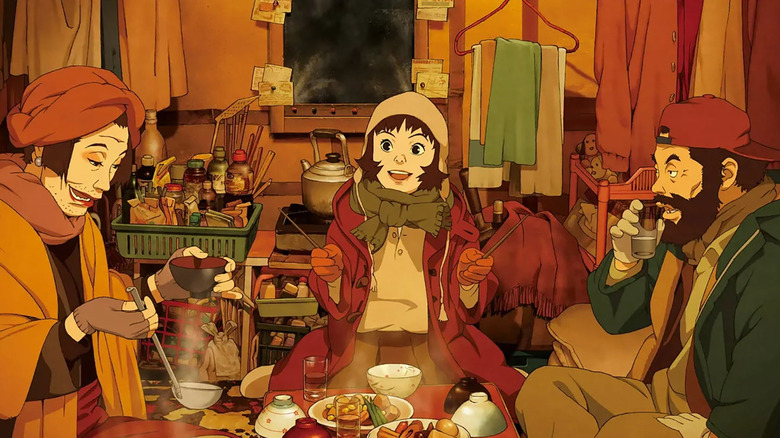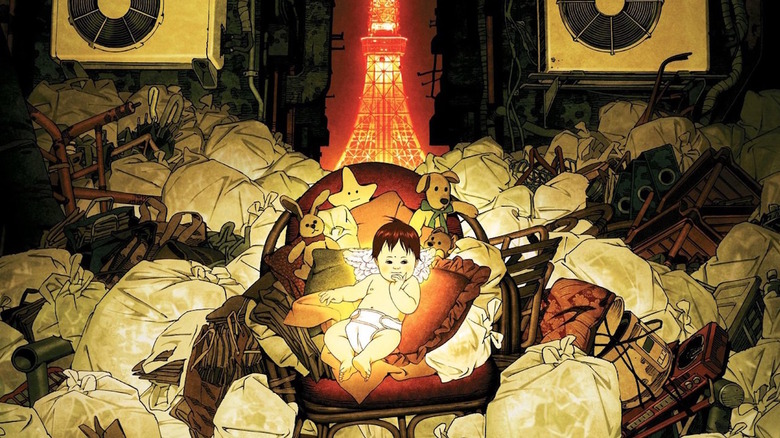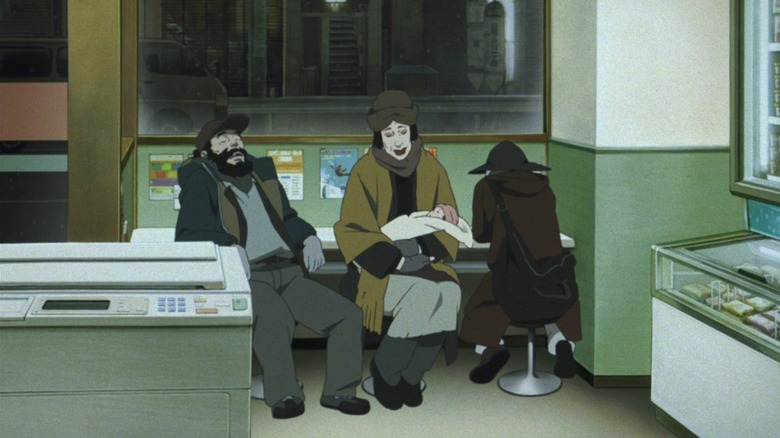Tokyo Godfathers Is An Anime Christmas Miracle About Animated Cinema's Merriest Motley Crew
(Welcome to Animation Celebration, a recurring feature where we explore the limitless possibilities of animation as a medium. In this edition: "Tokyo Godfathers.")
In Satoshi Kon's fantastic holiday fable, an unruly alcoholic named Gin, an angry and rebellious runaway teen named Miyuki, and a stoic albeit lonely trans woman named Hana are all surviving their Christmas Eve on the streets of Tokyo as a makeshift, houseless family. As the three dumpster dive to try and find something good to eat, they come across an abandoned newborn baby in the trash. With little to no information on the baby's identity, this ragtag trio spends their night desperately trying to find the parents of the infant and return the baby to safety.
If the premise of "Tokyo Godfathers" sounds vaguely familiar, it's because Kon was inspired by the John Ford western, "3 Godfathers," which starred John Wayne and was based on Peter B. Kyne's novel of the same name. Unlike his previous works, Kon firmly grounds "Tokyo Godfathers" in reality and trades in his typical polished animation style for something aesthetically harsher, a means to authentically represent the gritty underbelly of Tokyo's houseless community. It's a stellar juxtaposition, however, as the story is injected with Frank Capra-esque moments of holiday sentimentality, something seldom afforded to the characters at the center of the film. Co-written by Keiko Nobumoto of "Cowboy Bebop" fame, "Tokyo Godfathers" is an incredibly poignant story about found family, navigating feelings of personal shortcomings, and finding happiness even under the bleakest of circumstances. It's everything a holiday film should be, and humanizes groups of people that society often likes to pretend don't exist.
Finding beauty in the breakdown
There's a devastating honesty coursing throughout "Tokyo Godfathers," especially when looking at how the three main characters respond to finding the baby. The trio has just attended a youth performance of a nativity play when they come across the child, so there are some definite "Three Wise Men + Baby Jesus" metaphors at play. Gin and Miyuki want to take the child to the police even though both have a tumultuous relationship with the criminal justice system. Hana, however, sees the baby as a miracle, viewing the child as an answer to her prayers to have a baby of her own — something she believes could never be possible as a trans woman. She calls the child "Kiyoko," which derives from the Japanese word for "pure." This innocent child was abandoned, and despite their immediate impulses, the three make it their goal to find the child's parents, hopefully preventing the baby from growing up on the streets.
Satoshi Kon presents Gin, Miyuki, and Hana exactly as they are, and appropriately reflects the way society treats them — even if it hurts. The gravity of their life on the streets is never glossed over, but "Tokyo Godfathers" doesn't approach houselessness like a scared-straight-style cautionary tale. The family this trio has created may look odd from the outside looking in, but they are a family through and through. There's beauty to be found in this presentation of neorealism, even without sugarcoating the uncomfortable truths surrounding their systemic oppression.
The true meaning of Christmas
The Frank Capra-esque elements are bountiful after the trio of unlikely godparents finds Kiyoko, as their quest to bring the child to her parents coincidentally forces them to come face-to-face with their own mistakes that brought them to their current status. They encounter the yakuza, a frantic traffic chase, and a character with suicidal ideations. They also deliver a rage-fueled rant about not eating cats regardless of starvation status, explore the importance of dying with dignity, and witness an assassination attempt during a wedding. Their own plights are reflected in the many hijinks that ensure trying to get the baby home, often encountering the people they left behind when they initially took to the streets. The more they learn about the infant, the more they learn about each other, and they must unpack how their own decisions mimic the tragic circumstances that surround the child ending up in the trash in the first place.
While all of these situations sound (and are) understandably grim, "Tokyo Godfathers" drips with hope and humor. The film is scored by Keiichi Suzuki, who proves a jaunty and festive heartbeat to keep the film moving, and never lets the viewer forget that this is a holiday story. Three people thrown away by society dedicate their lives to taking care of this discarded infant, providing a level of empathy seldom offered to them. This motley crew has every right to feel angry and rejected by the world around them, but still strive to do the morally righteous thing.
"Tokyo Godfathers" showcases the true meaning of Christmas better than most "Christmas movies," and does so while painting an incredibly nuanced portrait of the people Christmas frequently forgets. Introduce this anime classic into your seasonal rotation — your holiday will be better for it.


